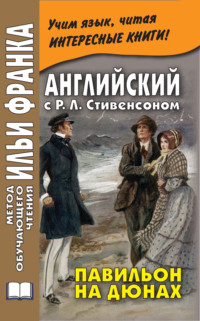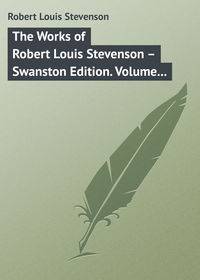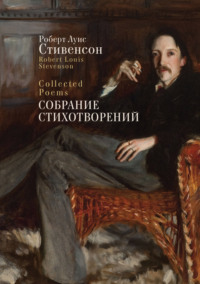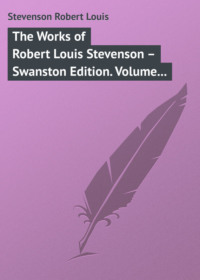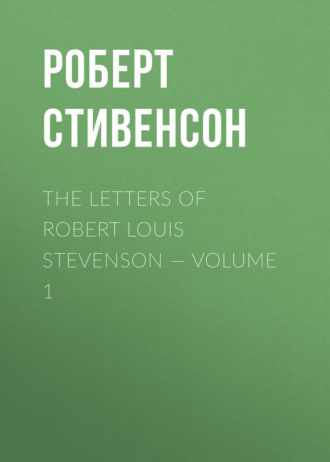 полная версия
полная версияThe Letters of Robert Louis Stevenson — Volume 1
For myself, I have come famously through the journey; and as I have written this letter (for the first time for ever so long) with ease and even pleasure, I think my head must be better. I am still no good at coming down hills or stairs; and my feet are more consistently cold than is quite comfortable. But, these apart, I feel well; and in good spirits all round.
I have written to Nice for letters, and hope to get them to-night.
Continue to address Poste Restante. Take care of yourselves.
This is my birthday, by the way — O, I said that before. Adieu. -
Ever your affectionate son,
R. L. STEVENSON.Letter: TO MRS. SITWELL
MENTONE, SUNDAY, NOVEMBER 1873MY DEAR FRIEND, — I sat a long while up among the olive yards to- day at a favourite corner, where one has a fair view down the valley and on to the blue floor of the sea. I had a Horace with me, and read a little; but Horace, when you try to read him fairly under the open heaven, sounds urban, and you find something of the escaped townsman in his descriptions of the country, just as somebody said that Morris's sea-pieces were all taken from the coast. I tried for long to hit upon some language that might catch ever so faintly the indefinable shifting colour of olive leaves; and, above all, the changes and little silverings that pass over them, like blushes over a face, when the wind tosses great branches to and fro; but the Muse was not favourable. A few birds scattered here and there at wide intervals on either side of the valley sang the little broken songs of late autumn and there was a great stir of insect life in the grass at my feet. The path up to this coign of vantage, where I think I shall make it a habit to ensconce myself a while of a morning, is for a little while common to the peasant and a little clear brooklet. It is pleasant, in the tempered grey daylight of the olive shadows, to see the people picking their way among the stones and the water and the brambles; the women especially, with the weights poised on their heads and walking all from the hips with a certain graceful deliberation.
TUESDAY. — I have been to Nice to-day to see Dr. Bennet; he agrees with Clark that there is no disease; but I finished up my day with a lamentable exhibition of weakness. I could not remember French, or at least I was afraid to go into any place lest I should not be able to remember it, and so could not tell when the train went. At last I crawled up to the station and sat down on the steps, and just steeped myself there in the sunshine until the evening began to fall and the air to grow chilly. This long rest put me all right; and I came home here triumphantly and ate dinner well. There is the full, true, and particular account of the worst day I have had since I left London. I shall not go to Nice again for some time to come.
THURSDAY. — I am to-day quite recovered, and got into Mentone to- day for a book, which is quite a creditable walk. As an intellectual being I have not yet begun to re-exist; my immortal soul is still very nearly extinct; but we must hope the best. Now, do take warning by me. I am set up by a beneficent providence at the corner of the road, to warn you to flee from the hebetude that is to follow. Being sent to the South is not much good unless you take your soul with you, you see; and my soul is rarely with me here. I don't see much beauty. I have lost the key; I can only be placid and inert, and see the bright days go past uselessly one after another; therefore don't talk foolishly with your mouth any more about getting liberty by being ill and going south VIA the sickbed. It is not the old free-born bird that gets thus to freedom; but I know not what manacled and hide-bound spirit, incapable of pleasure, the clay of a man. Go south! Why, I saw more beauty with my eyes healthfully alert to see in two wet windy February afternoons in Scotland than I can see in my beautiful olive gardens and grey hills in a whole week in my low and lost estate, as the Shorter Catechism puts it somewhere. It is a pitiable blindness, this blindness of the soul; I hope it may not be long with me. So remember to keep well; and remember rather anything than not to keep well; and again I say, ANYTHING rather than not to keep well.
Not that I am unhappy, mind you. I have found the words already — placid and inert, that is what I am. I sit in the sun and enjoy the tingle all over me, and I am cheerfully ready to concur with any one who says that this is a beautiful place, and I have a sneaking partiality for the newspapers, which would be all very well, if one had not fallen from heaven and were not troubled with some reminiscence of the INEFFABLE AURORE.
To sit by the sea and to be conscious of nothing but the sound of the waves, and the sunshine over all your body, is not unpleasant; but I was an Archangel once.
FRIDAY. — If you knew how old I felt! I am sure this is what age brings with it — this carelessness, this disenchantment, this continual bodily weariness. I am a man of seventy: O Medea, kill me, or make me young again!
To-day has been cloudy and mild; and I have lain a great while on a bench outside the garden wall (my usual place now) and looked at the dove-coloured sea and the broken roof of cloud, but there was no seeing in my eye. Let us hope to-morrow will be more profitable.
R. L. S.Letter: TO MRS. THOMAS STEVENSON
HOTEL MIRABEAU, MENTONE, SUNDAY, JANUARY 4, 1874MY DEAR MOTHER, — We have here fallen on the very pink of hotels. I do not say that it is more pleasantly conducted than the Pavillon, for that were impossible; but the rooms are so cheery and bright and new, and then the food! I never, I think, so fully appreciated the phrase 'the fat of the land' as I have done since I have been here installed. There was a dish of eggs at DEJEUNER the other day, over the memory of which I lick my lips in the silent watches.
Now that the cold has gone again, I continue to keep well in body, and already I begin to walk a little more. My head is still a very feeble implement, and easily set a-spinning; and I can do nothing in the way of work beyond reading books that may, I hope, be of some use to me afterwards.
I was very glad to see that M'Laren was sat upon, and principally for the reason why. Deploring as I do much of the action of the Trades Unions, these conspiracy clauses and the whole partiality of the Master and Servant Act are a disgrace to our equal laws. Equal laws become a byeword when what is legal for one class becomes a criminal offence for another. It did my heart good to hear that man tell M'Laren how, as he had talked much of getting the franchise for working men, he must now be content to see them use it now they had got it. This is a smooth stone well planted in the foreheads of certain dilettanti radicals, after M'Laren's fashion, who are willing to give the working men words and wind, and votes and the like, and yet think to keep all the advantages, just or unjust, of the wealthier classes without abatement. I do hope wise men will not attempt to fight the working men on the head of this notorious injustice. Any such step will only precipitate the action of the newly enfranchised classes, and irritate them into acting hastily; when what we ought to desire should be that they should act warily and little for many years to come, until education and habit may make them the more fit.
All this (intended for my father) is much after the fashion of his own correspondence. I confess it has left my own head exhausted; I hope it may not produce the same effect on yours. But I want him to look really into this question (both sides of it, and not the representations of rabid middle-class newspapers, sworn to support all the little tyrannies of wealth), and I know he will be convinced that this is a case of unjust law; and that, however desirable the end may seem to him, he will not be Jesuit enough to think that any end will justify an unjust law.
Here ends the political sermon of your affectionate (and somewhat dogmatical) son,
ROBERT LOUIS STEVENSON.Letter: TO MRS. THOMAS STEVENSON
MENTONE, JANUARY 7, 1874MY DEAR MOTHER, — I received yesterday two most charming letters — the nicest I have had since I left — December 26th and January 1st: this morning I got January 3rd.
Into the bargain with Marie, the American girl, who is grace itself, and comes leaping and dancing simply like a wave — like nothing else, and who yesterday was Queen out of the Epiphany cake and chose Robinet (the French Painter) as her FAVORI with the most pretty confusion possible — into the bargain with Marie, we have two little Russian girls, with the youngest of whom, a little polyglot button of a three-year old, I had the most laughable little scene at lunch to-day. I was watching her being fed with great amusement, her face being as broad as it is long, and her mouth capable of unlimited extension; when suddenly, her eye catching mine, the fashion of her countenance was changed, and regarding me with a really admirable appearance of offended dignity, she said something in Italian which made everybody laugh much. It was explained to me that she had said I was very POLISSON to stare at her. After this she was somewhat taken up with me, and after some examination she announced emphatically to the whole table, in German, that I was a MADCHEN; which word she repeated with shrill emphasis, as though fearing that her proposition would be called in question — MADCHEN, MADCHEN, MADCHEN, MADCHEN. This hasty conclusion as to my sex she was led afterwards to revise, I am informed; but her new opinion (which seems to have been something nearer the truth) was announced in a third language quite unknown to me, and probably Russian. To complete the scroll of her accomplishments, she was brought round the table after the meal was over, and said good-bye to me in very commendable English.
The weather I shall say nothing about, as I am incapable of explaining my sentiments upon that subject before a lady. But my health is really greatly improved: I begin to recognise myself occasionally now and again, not without satisfaction.
Please remember me very kindly to Professor Swan; I wish I had a story to send him; but story, Lord bless you, I have none to tell, sir, unless it is the foregoing adventure with the little polyglot. The best of that depends on the significance of POLISSON, which is beautifully out of place.
SATURDAY, 10TH JANUARY. — The little Russian kid is only two and a half: she speaks six languages. She and her sister (aet. 8) and May Johnstone (aet. 8) are the delight of my life. Last night I saw them all dancing — O it was jolly; kids are what is the matter with me. After the dancing, we all — that is the two Russian ladies, Robinet the French painter, Mr. and Mrs. Johnstone, two governesses, and fitful kids joining us at intervals — played a game of the stool of repentance in the Gallic idiom.
O — I have not told you that Colvin is gone; however, he is coming back again; he has left clothes in pawn to me. — Ever your affectionate son,
ROBERT LOUIS STEVENSON.Letter: TO MRS. SITWELL
MENTONE, TUESDAY, 13TH JANUARY 1874.. I LOST a Philipine to little Mary Johnstone last night; so to-day I sent her a rubbishing doll's toilet, and a little note with it, with some verses telling how happy children made every one near them happy also, and advising her to keep the lines, and some day, when she was 'grown a stately demoiselle,' it would make her 'glad to know she gave pleasure long ago,' all in a very lame fashion, with just a note of prose at the end, telling her to mind her doll and the dog, and not trouble her little head just now to understand the bad verses; for some time when she was ill, as I am now, they would be plain to her and make her happy. She has just been here to thank me, and has left me very happy. Children are certainly too good to be true.
Yesterday I walked too far, and spent all the afternoon on the outside of my bed; went finally to rest at nine, and slept nearly twelve hours on the stretch. Bennet (the doctor), when told of it this morning, augured well for my recovery; he said youth must be putting in strong; of course I ought not to have slept at all. As it was, I dreamed HORRIDLY; but not my usual dreams of social miseries and misunderstandings and all sorts of crucifixions of the spirit; but of good, cheery, physical things — of long successions of vaulted, dimly lit cellars full of black water, in which I went swimming among toads and unutterable, cold, blind fishes. Now and then these cellars opened up into sort of domed music-hall places, where one could land for a little on the slope of the orchestra, but a sort of horror prevented one from staying long, and made one plunge back again into the dead waters. Then my dream changed, and I was a sort of Siamese pirate, on a very high deck with several others. The ship was almost captured, and we were fighting desperately. The hideous engines we used and the perfectly incredible carnage that we effected by means of them kept me cheery, as you may imagine; especially as I felt all the time my sympathy with the boarders, and knew that I was only a prisoner with these horrid Malays. Then I saw a signal being given, and knew they were going to blow up the ship. I leaped right off, and heard my captors splash in the water after me as thick as pebbles when a bit of river bank has given way beneath the foot. I never heard the ship blow up; but I spent the rest of the night swimming about some piles with the whole sea full of Malays, searching for me with knives in their mouths. They could swim any distance under water, and every now and again, just as I was beginning to reckon myself safe, a cold hand would be laid on my ankle — ugh!
However, my long sleep, troubled as it was, put me all right again, and I was able to work acceptably this morning and be very jolly all day. This evening I have had a great deal of talk with both the Russian ladies; they talked very nicely, and are bright, likable women both. They come from Georgia.
WEDNESDAY, 10.30. — We have all been to tea to-night at the Russians' villa. Tea was made out of a samovar, which is something like a small steam engine, and whose principal advantage is that it burns the fingers of all who lay their profane touch upon it. After tea Madame Z. played Russian airs, very plaintive and pretty; so the evening was Muscovite from beginning to end. Madame G.'s daughter danced a tarantella, which was very pretty.
Whenever Nelitchka cries — and she never cries except from pain — all that one has to do is to start 'Malbrook s'en va-t-en guerre.' She cannot resist the attraction; she is drawn through her sobs into the air; and in a moment there is Nelly singing, with the glad look that comes into her face always when she sings, and all the tears and pain forgotten.
It is wonderful, before I shut this up, how that child remains ever interesting to me. Nothing can stale her infinite variety; and yet it is not very various. You see her thinking what she is to do or to say next, with a funny grave air of reserve, and then the face breaks up into a smile, and it is probably 'Berecchino!' said with that sudden little jump of the voice that one knows in children, as the escape of a jack-in-the-box, and, somehow, I am quite happy after that!
R. L. S.Letter: TO MRS. SITWELL
[MENTONE, JANUARY 1874.].. LAST night I had a quarrel with the American on politics. It is odd how it irritates you to hear certain political statements made. He was excited, and he began suddenly to abuse our conduct to America. I, of course, admitted right and left that we had behaved disgracefully (as we had); until somehow I got tired of turning alternate cheeks and getting duly buffeted; and when he said that the Alabama money had not wiped out the injury, I suggested, in language (I remember) of admirable directness and force, that it was a pity they had taken the money in that case. He lost his temper at once, and cried out that his dearest wish was a war with England; whereupon I also lost my temper, and, thundering at the pitch of my voice, I left him and went away by myself to another part of the garden. A very tender reconciliation took place, and I think there will come no more harm out of it. We are both of us nervous people, and he had had a very long walk and a good deal of beer at dinner: that explains the scene a little. But I regret having employed so much of the voice with which I have been endowed, as I fear every person in the hotel was taken into confidence as to my sentiments, just at the very juncture when neither the sentiments nor (perhaps) the language had been sufficiently considered.
FRIDAY. — You have not yet heard of my book? — FOUR GREAT SCOTSMEN — John Knox, David Hume, Robert Burns, Walter Scott. These, their lives, their work, the social media in which they lived and worked, with, if I can so make it, the strong current of the race making itself felt underneath and throughout — this is my idea. You must tell me what you think of it. The Knox will really be new matter, as his life hitherto has been disgracefully written, and the events are romantic and rapid; the character very strong, salient, and worthy; much interest as to the future of Scotland, and as to that part of him which was truly modern under his Hebrew disguise. Hume, of course, the urbane, cheerful, gentlemanly, letter-writing eighteenth century, full of attraction, and much that I don't yet know as to his work. Burns, the sentimental side that there is in most Scotsmen, his poor troubled existence, how far his poems were his personally, and how far national, the question of the framework of society in Scotland, and its fatal effect upon the finest natures. Scott again, the ever delightful man, sane, courageous, admirable; the birth of Romance, in a dawn that was a sunset; snobbery, conservatism, the wrong thread in History, and notably in that of his own land. VOILA, MADAME, LE MENU. COMMENT LE TROUVEZ- VOUS? IL Y A DE LA BONNE VIANDO, SI ON PARVIENT A LA CUIRE CONVENABLEMENT.
R. L. S.Letter: TO MRS. THOMAS STEVENSON
[MENTONE, MARCH 28, 1874.]MY DEAR MOTHER, — Beautiful weather, perfect weather; sun, pleasant cooling winds; health very good; only incapacity to write.
The only new cloud on my horizon (I mean this in no menacing sense) is the Prince. I have philosophical and artistic discussions with the Prince. He is capable of talking for two hours upon end, developing his theory of everything under Heaven from his first position, which is that there is no straight line. Doesn't that sound like a game of my father's — I beg your pardon, you haven't read it — I don't mean MY father, I mean Tristram Shandy's. He is very clever, and it is an immense joke to hear him unrolling all the problems of life — philosophy, science, what you will — in this charmingly cut-and-dry, here-we-are-again kind of manner. He is better to listen to than to argue withal. When you differ from him, he lifts up his voice and thunders; and you know that the thunder of an excited foreigner often miscarries. One stands aghast, marvelling how such a colossus of a man, in such a great commotion of spirit, can open his mouth so much and emit such a still small voice at the hinder end of it all. All this while he walks about the room, smokes cigarettes, occupies divers chairs for divers brief spaces, and casts his huge arms to the four winds like the sails of a mill. He is a most sportive Prince.
R. L. S.Letter: TO MRS. SITWELL
[SWANSTON], MAY 1874, MONDAYWE are now at Swanston Cottage, Lothianburn, Edinburgh. The garden is but little clothed yet, for, you know, here we are six hundred feet above the sea. It is very cold, and has sleeted this morning. Everything wintry. I am very jolly, however, having finished Victor Hugo, and just looking round to see what I should next take up. I have been reading Roman Law and Calvin this morning.
EVENING. — I went up the hill a little this afternoon. The air was invigorating, but it was so cold that my scalp was sore. With this high wintry wind, and the grey sky, and faint northern daylight, it was quite wonderful to hear such a clamour of blackbirds coming up to me out of the woods, and the bleating of sheep being shorn in a field near the garden, and to see golden patches of blossom already on the furze, and delicate green shoots upright and beginning to frond out, among last year's russet bracken. Flights of crows were passing continually between the wintry leaden sky and the wintry cold-looking hills. It was the oddest conflict of seasons. A wee rabbit — this year's making, beyond question — ran out from under my feet, and was in a pretty perturbation, until he hit upon a lucky juniper and blotted himself there promptly. Evidently this gentleman had not had much experience of life.
I have made an arrangement with my people: I am to have 84 pounds a year — I only asked for 80 pounds on mature reflection — and as I should soon make a good bit by my pen, I shall be very comfortable. We are all as jolly as can be together, so that is a great thing gained.
WEDNESDAY. — Yesterday I received a letter that gave me much pleasure from a poor fellow-student of mine, who has been all winter very ill, and seems to be but little better even now. He seems very much pleased with ORDERED SOUTH. 'A month ago,' he says, 'I could scarcely have ventured to read it; to-day I felt on reading it as I did on the first day that I was able to sun myself a little in the open air.' And much more to the like effect. It is very gratifying. — Ever your faithful friend,
ROBERT LOUIS STEVENSON.Letter: TO MRS. SITWELL
SWANSTON, WEDNESDAY, MAY 1874STRUGGLING away at FABLES IN SONG. I am much afraid I am going to make a real failure; the time is so short, and I am so out of the humour. Otherwise very calm and jolly: cold still IMPOSSIBLE.
THURSDAY. — I feel happier about the FABLES, and it is warmer a bit; but my body is most decrepit, and I can just manage to be cheery and tread down hypochondria under foot by work. I lead such a funny life, utterly without interest or pleasure outside of my work: nothing, indeed, but work all day long, except a short walk alone on the cold hills, and meals, and a couple of pipes with my father in the evening. It is surprising how it suits me, and how happy I keep.
SATURDAY. — I have received such a nice long letter (four sides) from Leslie Stephen to-day about my Victor Hugo. It is accepted. This ought to have made me gay, but it hasn't. I am not likely to be much of a tonic to-night. I have been very cynical over myself to-day, partly, perhaps, because I have just finished some of the deedest rubbish about Lord Lytton's fables that an intelligent editor ever shot into his wastepaper basket. If Morley prints it I shall be glad, but my respect for him will be shaken.
TUESDAY. — Another cold day; yet I have been along the hillside, wondering much at idiotic sheep, and raising partridges at every second step. One little plover is the object of my firm adherence. I pass his nest every day, and if you saw how he files by me, and almost into my face, crying and flapping his wings, to direct my attention from his little treasure, you would have as kind a heart to him as I. To-day I saw him not, although I took my usual way; and I am afraid that some person has abused his simple wiliness and harried (as we say in Scotland) the nest. I feel much righteous indignation against such imaginary aggressor. However, one must not be too chary of the lower forms. To-day I sat down on a tree- stump at the skirt of a little strip of planting, and thoughtlessly began to dig out the touchwood with an end of twig. I found I had carried ruin, death, and universal consternation into a little community of ants; and this set me a-thinking of how close we are environed with frail lives, so that we can do nothing without spreading havoc over all manner of perishable homes and interests and affections; and so on to my favourite mood of an holy terror for all action and all inaction equally — a sort of shuddering revulsion from the necessary responsibilities of life. We must not be too scrupulous of others, or we shall die. Conscientiousness is a sort of moral opium; an excitant in small doses, perhaps, but at bottom a strong narcotic.


